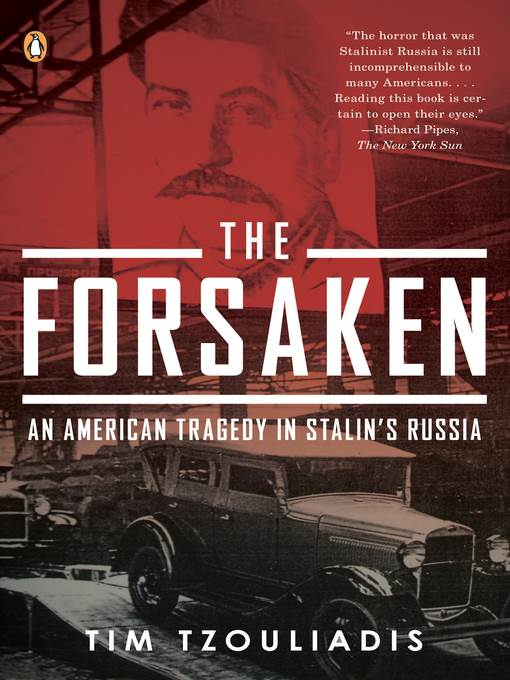
The Forsaken
An American Tragedy in Stalin's Russia
- اطلاعات
- نقد و بررسی
- دیدگاه کاربران
نقد و بررسی

May 5, 2008
The strength of this history lies in the compelling stories it tells about the hundreds, perhaps thousands, of Americans who moved to the Soviet Union only to be imprisoned or killed by the Communist state. Many of those tracked by documentary filmmaker and television journalist Tzouliadis came to the Soviet Union during the Depression seeking economic opportunity or because they believed in Communist ideology. After a quick romance, the harsh reality set in as they were sent to languish or die in Stalin's prison camps. When Tzouliadis focuses on individual stories, such as that of Thomas Sgovio, who was imprisoned for almost a quarter-century before being allowed to return to the West, his words leap off the page. Too often, however, he veers away from his main subject with criticism of American journalists, ambassadors, artists and fellow travelers such as Paul Robeson and Walter Duranty who were either taken in by Soviet propaganda or willing to overlook state brutality. These stories have been told elsewhere and with more nuance, and here they detract from what is otherwise a captivating history.

May 1, 2008
It seems incredible that millions of desperate or idealistic souls who believed in the revolution left the United States, fleeing the Depression, and flocked to the new Soviet state in hopes of starting life over. The fate of those who once had such faith in the Soviet experiment is tragically chronicled in these two works. Pringle ("Insight on the Middle East War") presents his work from the viewpoint of an insider, foremost Soviet biologist Nikolai Ivanovich Vavilov, who ran afoul of the regime when Stalin championed Trofim Lysenko, whose views were eventually discredited. Vavilov amassed one of the largest seed collections in the world and hoped to prevent the famines that had plagued the USSR and other countries. As the terror of the 1930s mounted, Vavilov apparently continued to believe in the revolution until it was too late. Left to languish in the Gulag, this "eminent plant hunter who had a plan to feed the world died of starvation," concludes Pringle. Documentary filmmaker and television journalist Tzouliadis traces the lives of immigrants to the USSR and their fate in the land of the revolution. Most eventually perished once the Stalinist state declared them to be enemies. This is a collection of heartbreaking stories about people who were neglected or ignored by their own government. The author presents numerous instances in which official intervention might have saved thousands of lives, yet officials, from President Roosevelt on down, found it inconvenient or untimely to risk disrupting U.S.-Soviet relations by peering too closely into the cases of U.S. citizens stuck in the USSR. "The Forsaken" is actually a grim testament of Stalin's crimes against his own people as well as the immigrants. With copious notes, it is highly recommended for public and academic libraries. "Vavilov" is written in a popular style sometimes lacking nuance on a subject that should still be of interest to academics as well as informed readers. (Photos not seen for "Vavilov".)Edward Cone, New York
Copyright 2008 Library Journal, LLC Used with permission.

July 1, 2008
One footnote to the Depression was the departure of unemployed Americans for jobs in the Soviet Union. Subsequently swept into the gulag, few of the few thousand who emigrated survived. Two who did have their personal testimonies incorporated into Tzouliadis account of this obscure American exodus, in which the underlying tragedy was compounded by scant assistance extended to these U.S. citizens by the U.S. Embassy in Moscow. Citingdiplomats thoughtsabout the immigrantsstatus, Tzouliadis recognizes the Soviet chicanery faced by officialssuch asGeorge Kennan but reserves his scorn for American apologists of the Soviet regime who were aware, orshould have been aware, of the plight of the Americans. Singer Paul Robeson, who had his picture taken with an American expat baseball team; Ambassador Joseph Davies, who advised the purges were a response to genuine conspiracies; Vice President Henry Wallace, who declared nothing amiss after touring the gulagthese famous Americans of the period have their gullibility contrasted against the reality of Americans destroyed by Stalin. A searing history informed by moral sense and original research.(Reprinted with permission of Booklist, copyright 2008, American Library Association.)




دیدگاه کاربران